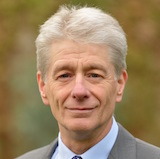Professor Peter Robinson took up the post as Head of School on 4th January 2016 so we prompted him to look back on his first six months at Bristol:
His first thought was to acknowledge how welcoming everybody had been. “I spent the first few weeks going to speak to colleagues across the School and was really impressed with their openness and dedication. I feel very lucky to be working as part of such an excellent team.
The School is in an excellent position, with a glowing GDC inspection report for the BDS programme and world leading and internationally excellent research highlighted in REF2014.
There are some important challenges ahead though. We are a number of clinical academics short in Restorative Dentistry and unfortunately there is an international shortage in that discipline, so we’re going to have to think creatively about that. Nicola West has taken on leadership responsibilities for the academic side of Restorative Dentistry, which will be a real help as she is creative, super-organised and knows everyone in the field.
Another thing we’ve started on is maximising students’ opportunities at South Bristol. We’d like their experience there to mimic working in primary care as much as possible, finding the optimal blend between clinical excellence, patient-centred care and efficiency. We’ve revised the booking system to allow this and are reviewing the patients on the recall list. We’re hoping to make a number of clinical teaching fellow appointments at the dental hospital so that we can also move some of the learning from the tutorials at South Bristol up to the main building.
We’re also reflecting on the existing curriculum. Rebecca John, Andrea Waylen, Nigel Robb and Dave Dymock are doing that at the moment. They held a hugely successful launch event earlier this month, which gave the process considerable momentum. The existing curriculum is ten years old by now and we all know how much dentistry and oral health in general have changed in that time. We need to know whether the existing curriculum is fit for purpose, whether it needs some tweaks or whether we need to revise it more substantially. The group are due to report in September, which will be very interesting. If there is more work to be done we will instigate a system to manage any changes, which James Tubman will lead with his usual thoroughness and imagination.
On top of all that, we’re introducing a new suite of postgraduate programmes this autumn, with a certificate in oral surgery, an MSc in Sedation, and with luck an MSc in Oral Medicine and Pathology by the new year. A lot of people are working hard on this, guided by Tony Ireland and Dave Dymock.
We were very lucky to have Andy Ness to succeed Howard Jenkinson as Director of Research. I think Howard had been in the role for 12 years, but Andy is raring to go. He’s been exchanging ideas with all the School’s researchers over the last few months and will propose a new strategy in the coming months. That strategy will need to fit in with our new PVC’s (John Iredale) approach to co-ordinate research across our faculty as well as Biomedical Science. The intention is to focus on a small number of key areas for critical mass and strength. This should suit us well as SORDS’ research maps directly onto these areas already.
We’ve had some real research endeavour and success. Andy Ness collaborated with others across the faculty to submit a huge bid for a Biomedical Research Centre, which could position us very well for years to come. Michelle Barbour’s spin-out company (Pertinax) has received £900k investment and is looking at introducing Chlorhexidine into dental restorations to reduce the incidence of secondary caries. Given the distribution of caries this could be a much needed intervention.
We’ve also strengthened our ties with the Dental Hospital as there is much we can do for mutual benefit. As the new lead doctor, Becky Davies has proved to be an open and committed colleague. Our work together is not easy as we represent different organisations with sometimes competing priorities. Yet we work well together. One result has been the allocation of the £450k capital budget, which has funded new equipment and upgraded facilities to the benefit of patients, students and staff.
It’s been a busy six months! But I’d like to finish in the same way that I started, by thanking everyone for their welcome, their kindness and their hard work. I look forward to working with everyone in the years to come.”
